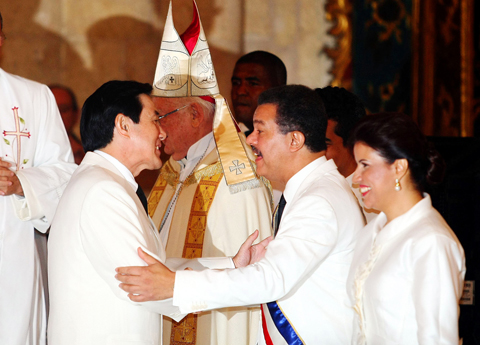The Dominican Republic and Taiwan will resume negotiations on a free-trade agreement (FTA) to strengthen trade and investment relations between the two countries, Presidential Office Spokesman Wang Yu-chi (王郁琦) said yesterday.
Following the conclusion of the first round of FTA talks in October 2006, the two countries were unable to hold the second series of talks scheduled for April last year.
In a meeting with Dominican Republic President Leonel Fernandez, who was sworn in for a third term on Saturday, President Ma Ying-jeou (馬英九) proposed to continue with the negotiations on the foundations set during the first round, which was welcomed by Fernandez, Wang said.

PHOTO: CNA
Fernandez said his country wished to enhance economic and investment relations with Taiwan and learn more about how its science parks came about, Wang said.
Ma told Fernandez the two parties would benefit from an FTA framework as it would allow Taiwan to use the Dominican Republic as a launching pad into the American market and encourage more Taiwanese businesses to invest in the Dominican Republic.
The Central America-Dominican Republic-US Free Trade Agreement (CAFTA-DR), signed in August 2004, eliminates tariffs and trade barriers among the members.
Taiwanese businesses with investment in the countries can enter the US market and obtain the preferential tariffs enjoyed by member countries.
So far, Taiwan has signed FTAs with five Central American countries — Panama, Guatemala, Nicaragua, El Salvador and Honduras.
All are diplomatic allies of Taiwan.
Ma left the Dominican Republic yesterday morning, wrapping up his eight-day state visit to Latin America and the Caribbean.
During his stay in the Dominican Republic, Ma also held meetings with Haitian President Rene Preval and Salvadoran President Elias Antonio Saca.
Ma also held meetings with Panamanian President Martin Torrijos, Paraguayan President Fernando Lugo and Honduran President Manuel Zelaya.
In total, Ma held meetings with six heads of state in Latin American and the Caribbean, where 12 of the country’s 23 allies are located.
“In the six days I spent in the region, I met six presidents and had deep and far-reaching exchanges with them,” Ma said.
Ma said he had prepared the topics of discussion ahead of the meetings, which included his strategy behind the “diplomatic truce” with China and its impact on Taiwan’s allies.
“They all agreed with the idea, because it is pragmatic and would not hurt their interests,” Ma said.
“We are not opposed to their plans to develop economic and trade relationships and cultural exchanges with China, as they do not represent unofficial activities,” he said.
Ma said aid projects to the countries would remain unchanged and that Taipei intended to increase its aid budget, as Taiwan spends less than 0.14 percent of its national income on aid, which fails to meet the target of 0.7 percent set by the UN.
Taipei would also develop a mechanism to ensure that the budget earmarked for foreign aid is used strictly for that purpose and spent in a transparent way, he said.
Ma is scheduled to return to Taipei early Thursday morning after a refueling stop in Austin, Texas, and a brief stopover in San Francisco.

An essay competition jointly organized by a local writing society and a publisher affiliated with the Chinese Communist Party (CCP) might have contravened the Act Governing Relations Between the People of the Taiwan Area and the Mainland Area (臺灣地區與大陸地區人民關係條例), the Mainland Affairs Council (MAC) said on Thursday. “In this case, the partner organization is clearly an agency under the CCP’s Fujian Provincial Committee,” MAC Deputy Minister and spokesperson Liang Wen-chieh (梁文傑) said at a news briefing in Taipei. “It also involves bringing Taiwanese students to China with all-expenses-paid arrangements to attend award ceremonies and camps,” Liang said. Those two “characteristics” are typically sufficient

A magnitude 5.9 earthquake that struck about 33km off the coast of Hualien City was the "main shock" in a series of quakes in the area, with aftershocks expected over the next three days, the Central Weather Administration (CWA) said yesterday. Prior to the magnitude 5.9 quake shaking most of Taiwan at 6:53pm yesterday, six other earthquakes stronger than a magnitude of 4, starting with a magnitude 5.5 quake at 6:09pm, occurred in the area. CWA Seismological Center Director Wu Chien-fu (吳健富) confirmed that the quakes were all part of the same series and that the magnitude 5.5 temblor was

The brilliant blue waters, thick foliage and bucolic atmosphere on this seemingly idyllic archipelago deep in the Pacific Ocean belie the key role it now plays in a titanic geopolitical struggle. Palau is again on the front line as China, and the US and its allies prepare their forces in an intensifying contest for control over the Asia-Pacific region. The democratic nation of just 17,000 people hosts US-controlled airstrips and soon-to-be-completed radar installations that the US military describes as “critical” to monitoring vast swathes of water and airspace. It is also a key piece of the second island chain, a string of

The Central Weather Administration has issued a heat alert for southeastern Taiwan, warning of temperatures as high as 36°C today, while alerting some coastal areas of strong winds later in the day. Kaohsiung’s Neimen District (內門) and Pingtung County’s Neipu Township (內埔) are under an orange heat alert, which warns of temperatures as high as 36°C for three consecutive days, the CWA said, citing southwest winds. The heat would also extend to Tainan’s Nansi (楠西) and Yujing (玉井) districts, as well as Pingtung’s Gaoshu (高樹), Yanpu (鹽埔) and Majia (瑪家) townships, it said, forecasting highs of up to 36°C in those areas